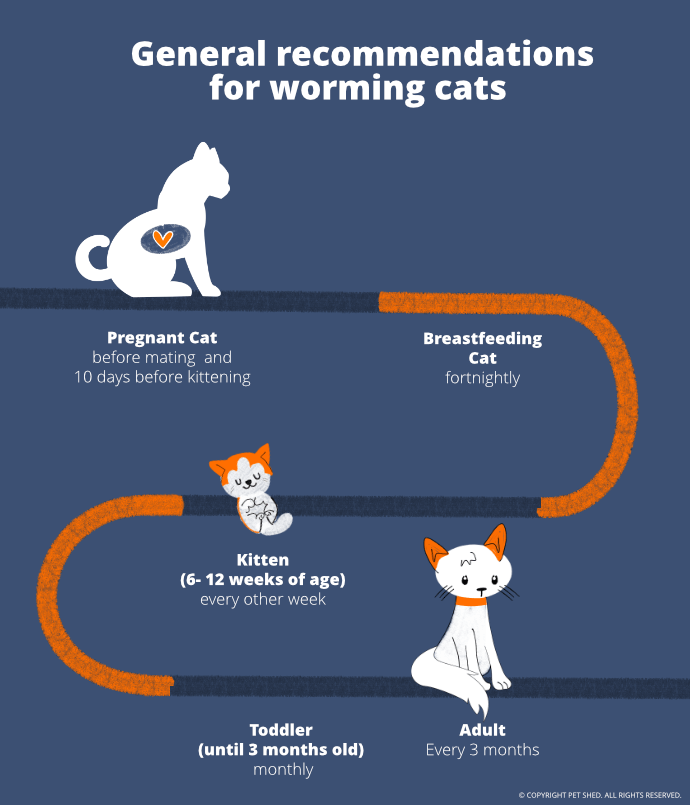June 11, 2020

Worming your cat is important not only for the cat's health but for yours as well, as some cat parasites can be transmitted to humans. Cat worming treatment frequency depends on their age, their habitat and the parasites prevalent in their surroundings.

What is worming?
For the purposes of this article, worming your cat means treating it for intestinal parasites. Giving a heartworm-preventative medication is examined in other Pet Shed articles.
The intestinal worms commonly affecting cats in the US are:
- roundworms (Toxocara cati and Toxascaris leonina)
- hookworms (Ancylostoma tubaeforme, Ancylostoma brazilense and Uncinaria stenocephala)
- and tapeworms (Dipylidium caninum, Taenia taeniaeformis and very occasionally Echinococcus spp)

How can cats get worms?
Cats can become infected with these worms in various ways, including accidentally swallowing them in the grass or something else they are eating, such as a mouse. Some penetrate the skin, while others pass from mother to kitten via the milk.

Why should I worm my cat?
When the parasites enter a cat's body, some will head straight for the intestines while others migrate around the body first. The problems they cause, most often diarrhea, generally relate to their living and feeding in the intestine. Some parasites also cause vomiting or weight loss, while others cause blood loss.

How do cats pass worms to humans?
Some cats can have worms with no signs of infection at all. Most worming treatments will kill the adult worms living in the intestines at the time of treatment. The time it takes for the parasites to mature to a stage where they can produce eggs is what determines the frequency of most parasite treatment programs.
"People who pat a cat infected with parasite larvae who forget to wash their hands before eating a meal could accidentally infect themselves."
This is important because the eggs which are produced are excreted in cat feces and can develop to a larval stage which is infectious to humans. People who pat a cat infected with parasite larvae who forget to wash their hands before eating a meal could accidentally infect themselves. These worms can cause problems in humans when they migrate through the body.

How should I use cat wormers?
So, to prevent the disease in both cats and humans, the following general recommendations for worming cats may be useful, though they will not apply in all situations.
- Kittens should be treated for intestinal worms at six, eight, ten and 12 weeks of age, then monthly until they are three months old, then at least every three months throughout life.
- Female cats should be wormed before mating, and pregnant cats should be treated ten days before kittening and fortnightly while the kittens are suckling.

How do I pick the right wormer for my cat?
There are several ingredients available which effectively kill various worms. Many products combine a number of ingredients to kill all of the worms listed above, so when selecting a product, look at the list of worms it will act against to ensure you are worming your pet completely.
Cat anti-worm treatments
Pet Shed's most popular solutions for worming your cat
Worming pastes, tablets and even topical liquids exist to treat your cat. Your veterinarian can advise you on the most appropriate choice for your cat.
References:
